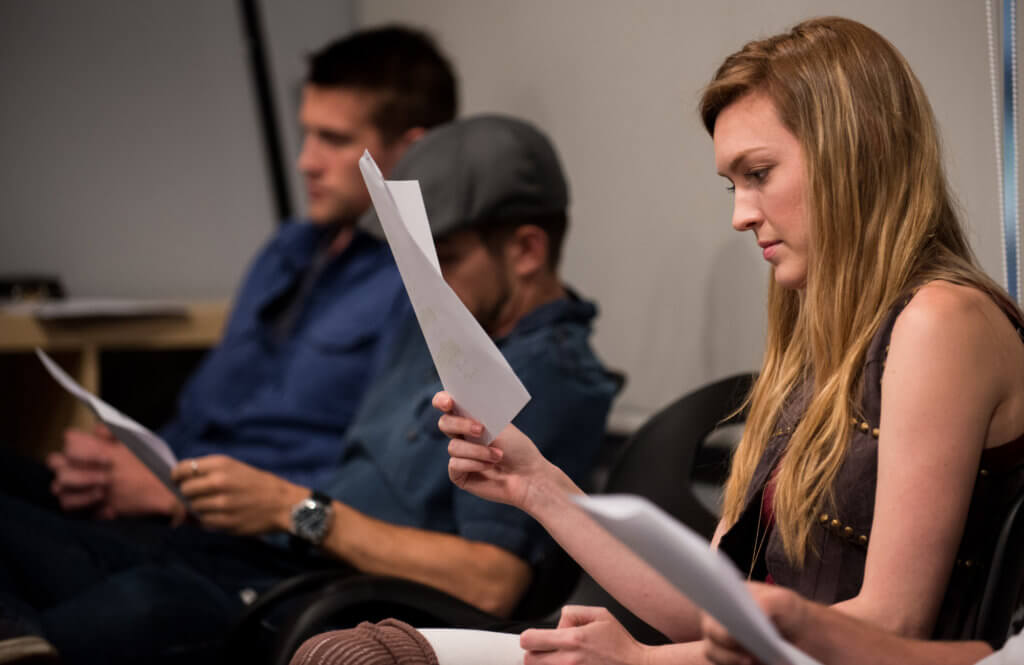How to nail a scripted comedy audition

You have an audition coming up. You’re given a script. It’s a short, funny scene.
Everybody (not just your mom) tells you you’re funny, so this should be easy. Just… make people laugh… but with lines someone else wrote.
Wait. How do you do that? Usually, when you make people laugh, it’s because there’s milk coming out of your nose or you’ve masterminded some kind of complex inside joke unwinding among your friends. How do you make someone else’s words funny? In an audition room filled with strangers, no less?
The answer is a mix of exactly who you are when your friends are giggling at your ridiculousness plus a secret sauce of technical skills that I’m gonna lay down right now. And HERE. WE. GO.
Start one place, end somewhere else
Read your scene a few times. Take note of your first impressions. Otherwise, you’ll work on it for awhile and you may forget what your very first impressions were. Don’t! They often hold the keys to your scene. What do you think of the scene upon first read, and how does it make you feel when you first read it?
Then, read it again, with this in mind: Where does the character start out, emotionally and physically, and where does she end? This is your arc. Like that curved line, it starts one place and ends another. Trace that arc and voila! You have a journey, like a little play.
Want something so badly, you could puke
What does your character want? Once you’ve answered this question, multiply the intensity by ten. Your character, in this scene, must want something so badly that it’s physically uncomfortable. EXAMPLE TIME! If you saw Lady Bird, think of that grocery store scene where she is talking to a boy she likes. (NO SPOILERS, I’M JUST SAYING SHE TALKS TO A BOY, OKAY?) She wants so badly to make a good impression and to get him to like her. If that was your audition scene, that would be the want. You can see in the scene how this want makes the actress nervous and how that’s expressed physically (in this case, shallow breathing, intense eye contact, facial tension).
This is not only true for scenes that have romance in them. Your character can desperately want to join Mathletes, or go zip-lining in Costa Rica, or acquire an ugly Christmas sweater. There is no end to what a character can want, but it must be a longing that you, as the actress, experience to be intense. The more intense it is, the more heightened the comedy.
Make the obstacle so big that you can’t stand it
This goes directly with the want. Something epic stands in the way of your want. Keep the want and the obstacle at the front of your mind are as you prepare your scene.
Romeo and Juliet really want to hang out with each other. The obstacle is that their families hate each other, and they are forbidden to do so.
In my silly zip-lining example, maybe the character wants to zip-line, but her uncle had a tragic zip-lining accident in the ’80s and therefore her family has an iron-clad no zip-lining policy due to their tragedy. The family trauma is, therefore, the obstacle that this character faces. She must go against her family’s wishes to do the thing she most wants in the world.
Raise the stakes
You may have heard directors yell at you to “raise the stakes!” I didn’t really get what this meant until I was around 30, so I’m gonna save you some time here so you can have fewer years of bad acting than I do. The stakes are what you will lose or gain if you can’t surpass the obstacle to get your want.
Lady Bird, in the grocery store scene, will either impress this lovely boy or lose him forever based on this conversation and the impression she makes. (That may not be true, but that’s what the actress must believe to create the stakes of the scene.)
In the Mathlete example, if the scene is the big Mathletes tournament, the stakes are that the actress will either bring her team to glory, or bring her team to shame and loss based on her performance in this one type of equation she has prepared to solve all year.
Get the idea? Stakes are high when the thing to be lost is equal but opposite of the thing to be gained. Life and death in every situation. That’s what makes you, as an actress, exciting to watch. Commit to the stakes of your scene so much that your palms sweat. Being a human is hard, so represent it accurately!
Make it about the other person
Your scene partner (for the audition) will most likely just be a reader doing the scene opposite you. This person may or may not be bringing much to the role, but your job is to listen and be affected and moved by every little thing the reader says. Your scene partner is very important. Everything they say has some effect on you. Don’t fall into the trap of focusing only on your lines. Equally important is everything you are hearing and the way you react in silence.
Remember that actions speak louder…
Each line you say to someone else has an associated action. Actions are verbs. You can use a line to impress your scene partner, to scold your scene partner, to warn your scene partner. You will be amazed how the lines come alive when you assign a particular action to them. Play around, reading each line with different actions, and see how your performance of the line changes.
Be sure to direct your actions toward your target. Your scene partner is that target, and every action must fall on them, because you are seeking to affect them just as they will affect you.
Find the funny
Oh right! It’s a comedy scene! Now that you’ve done the basic scene work, you get to be a comedy detective. I find this part the easiest and most fun, but for dramatic actors newly trying their hand at comedy, sometimes the emotional stuff (which often lives in wants/obstacles/stakes) will come more easily, and the comedy sleuthing can feel like foreign territory.
Be able to say in one clear statement why something is funny to you.
Example: I find the Lady Bird scene funny because the way she flirts with the boy is to use stock phrases she’s heard from magazines and TV. She doesn’t sound like an actual human.
What are some other scripted scenes from TV, movies, YouTube that made you laugh? Go back and watch them again. Can you articulate in one sentence what was consistently funny about that scene?
Heighten the funny
You’ve got to know why something is funny so you know how each funny moment heightens. You have uncovered the skeleton of the scene, and now you can flesh it out.
In Lady Bird, this funny detail heightens because she does it multiple times. It becomes more absurd as the conversation goes on because it’s weird to chat with someone for a length of time and still be speaking stock flirting phrases plucked from the pages of a magazine.
Find the operative words
Just like a dramatic scene, a comedic scene will have lines and words that are more important than the others. Find the most important word or two in each sentence as well as the lines in your scene that matter the most to you.
Observe how you speak in your life. Some stuff you just say to fill silence, but at important moments in your life, chances are you speak to be heard. See if you can pick out the difference. Writers choose important moments to write about, and in a good comedic scene, your character really cares about what she is saying.
And…your major takeaway
Comedic scenes have high stakes and require an actor to understand why the text is funny, so she can heighten the funny behavior pattern as the scene goes.
Questions? That’s like 20 years of actor-training distilled in one article. You must have questions! Hit me up @emmatattenbaum (cc: @goldcmdy) on Twitter and let’s get nerdy about comedy acting.
